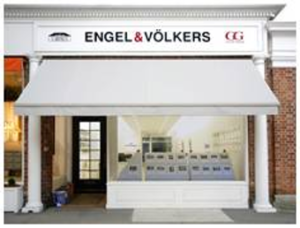We think it is interesting to note that during these very difficult times in real estate a new comer to the U.S. real estate market is successfully expanding their franchise operations. As Stefan Swanepoel reported today in Inman news (http://www.inman.com/node/94265) Engel & Völkers announced that it signed its 555th license, worldwide, with the signing of the license region for Beverly Hills, Bel Air and Westwood in California.
 By way of background, Engel & Völkers is a luxury real estate company headquartered in Hamburg, Germany that has a unique international property shop concept. All Engel & Völkers franchises must be built out to specific design requirements from the white, classic European façade to the clean white interiors and beyond. Also, location of shops is strictly controlled and maybe most importantly, shops typically only have from 10 to 20 agents at maturity. They have built their brand around the idea that every agent in a shop needs to be a high performer and while their model is very “high end” the size and scale allow them operate in “A” locations, at a reasonable earnings to expense ratio that may very well become the model of future real estate operations.
By way of background, Engel & Völkers is a luxury real estate company headquartered in Hamburg, Germany that has a unique international property shop concept. All Engel & Völkers franchises must be built out to specific design requirements from the white, classic European façade to the clean white interiors and beyond. Also, location of shops is strictly controlled and maybe most importantly, shops typically only have from 10 to 20 agents at maturity. They have built their brand around the idea that every agent in a shop needs to be a high performer and while their model is very “high end” the size and scale allow them operate in “A” locations, at a reasonable earnings to expense ratio that may very well become the model of future real estate operations.
In late 2006, they decided to enter the U.S. market. The reason they chose that time to come to the U.S, after being in 24 other countries on 5 continents was largely being driven by the favorable European and world currency conditions, relative to the U.S. dollar. Everybody believed money was ready to pour into our market as a result of these great exchange rates. And it did, at least until this perfect storm hit the world real estate market.
Nevertheless, they began in Florida, then went to New York and New England and late in 2008 opened up operations in California. So why are they having success during a time when many others aren’t? Why is their franchise sales strategy working when others don’t seem to be or are actually closing more offices than they are selling? I think there are a number of reasons worth noting that may be of interest to other companies as they try to weather the storm.
- The Shop Concept – In an industry where most real estate do things pretty much like the next their shop concept is really unique. These shops are typically 1500 to 2500 square feet and are integral parts of their marketing concept. Put in ‘A” locations pedestrian with heavy pedestrian traffic they showcase local and international properties in their windows and always seem to have someone standing out front checking them out.
- The right 90/10 rule – Their concept teaches their owners not to rely on numbers of agents but quality of agents instead. They only want high quality agents that fit their company culture.
- Company culture – Engel & Völkers is a very “broker centric” model. In this day and age where agent’s rule in most companies Engel & Völkers stresses is it their brand, not the agent brand that must be promoted. Agents in turn realize this serves them as well since they are all promoting the brand rather than diluting it by agents promoting their own brand.
- Reasonable splits – I spoke recently to an Engel & Völkers owner in Massachusetts that opened late 2008. They have a number of new agents that have joined them from other companies with impressive track records and these agents came aboard on a 50/50 split even though they had a higher split at their old company? Why? Because they believe they will do better in the end. Engel & Völkers recommends a sliding scale that typically goes up to a 70/30 split with high production but that has to be re-earned year to year.
- International network that works – Since they control the quality of every shop, location and owner they have created a network world-wide of very like-minded individuals that joined them in large part because they wanted to be part of an international network. The amount of cross country business being done on their network is very impressive.
We believe in the future we will see more companies adopt similar strategies which in the long term will strengthen our business. Brokers will no longer be willing to run huge operations where anyone can hang a license. Standards have to continue to rise and real estate companies have to continue to raise the bar because there is a cost associated with every agent. There is a cost in terms of real office expenses and also in terms of management time and even “office self esteem”! When a company has numerous non-performing agents in it this has to have an effect on the self esteem of the company. We have all had the experience of working with high caliber individuals sometime in our life and we know that when we are around really talented, motivated people it raises everyone’s level. This is common to most vibrant businesses but in real estate, where “more the merrier” has been the theme, many didn’t see any downside to having large numbers of agents even if they weren’t producing much. Well, times are changing.
It will be interesting to keep an eye on Engel & Völkers and their U.S. expansion as well as other companies to see what strategies they use to get through these challenging times. In the end we expect leaner, better, more professional shops to be the rule, not the exception in our industry because it is just too competitive out there and that’s a good thing for everyone.



